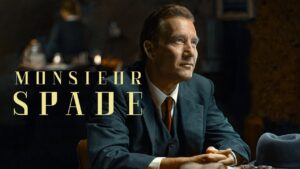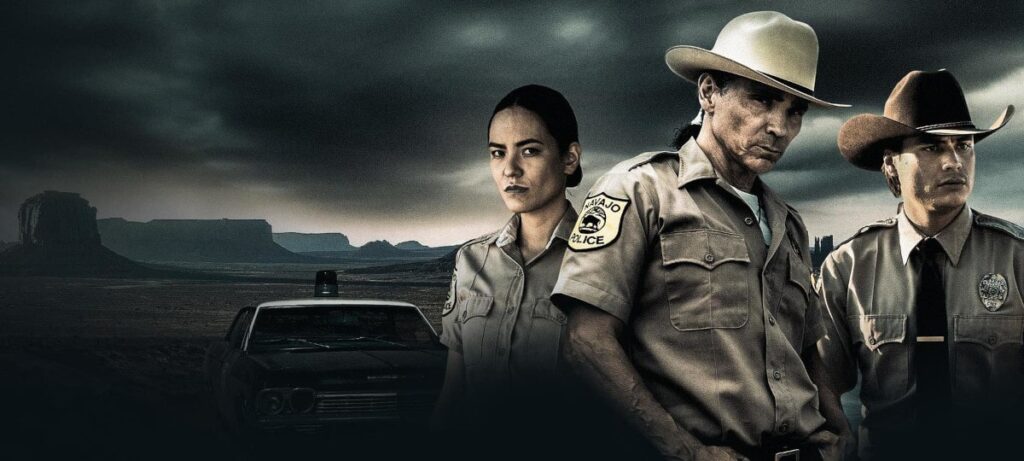I recently finished watching Monsieur Spade on AMC and I’m sorry to say I didn’t enjoy it all that much. It’s a real lost opportunity because I absolutely love the premise of the show.
As a young man I read Dashiell Hammit and the Maltese Falcon is a happy memory indeed. I’ve enjoyed watching many a movie with a noir theme and who doesn’t love the hardboiled detective Sam Spade and his many imitators?
What went wrong with Monsieur Spade? Let’s discuss.
Premise
The premise is c’est magnifique. Sam Spade is retired and now living in the small town of Bozouls in the south of France. We imagine his peaceful existence won’t stay that way for very long and we are right. He came to the region years ago to deliver the daughter of a client to her reported father. While trying to do so he met and married a wealthy French woman, Gabrielle, who has since died and left Monsieur Spade her vineyards.
The father of the girl, who is now a teenager, is a miscreant of the worst sort and involves Sam and others in the town in an all but impossible to follow plot involving a boy-genius and so many other parties it boggles the old gray matter of your narrator.
Noir Dialog and nothing but Noir Dialog
We certainly expect Monsieur Spade to deliver laconic lines and always with a cool demeanor. But do we expect every single line of dialog to be a battle of noir? I don’t. It’s not only Sam who talks like this but the rest of the cast as well. It’s a figurative battle of pithy utterances, one after the other, batted back and forth like a ball at a Wimbledon tennis match. Boom, bang, smash, crush.
Sam is never perturbed; he always knows exactly what to say and he’s not alone. The entire cast delivers nothing but noir and more noir.
“It’s raining, Sam.”
“Here I thought it was a poodle with a full bladder on the balcony.”
“Poodles are German, not French.”
“How can they tell?”
It never stops. Just one pithy comment after the next and it gets annoying all too quickly. It was great for about half an episode but it loses its charm quickly. We need fully developed characters who behave like real people.
Nonsensical Plot
Paraphrasing a laconic Spartan after a long speech entreating their aid in battle; “We no longer remember the first half of your plot, and thus can make nothing of the remainder.” There is a lot to process. I’m not going to get into it all but give a few examples.
The supposed monk who seemed like he was going to be an important character. He shows up, kills half-a-dozen nuns, one of whom was the most interesting character in the series, and then vanishes until the finale, supposedly taken off by French gendarmes to Paris. When did he get back? Who is he? Where did he come from? None of it is answered.
There are dozens of moments and characters like this. Characters make no sense and act irrationally at best. The entire side plot with the singer and her drunken husband didn’t further the plot in any way and his death seemed so unnecessary. Likewise, the death of the young English spy came out of nowhere and just baffled me.
The young girl suddenly knows details about her life she previously did not but no explanation as to how she learned them. I could go on but I shall cease in the name of brevity.
Sam Spade Torturing a Guy
I honestly don’t like a protagonist who tortures someone, particularly when the character already knows all the information he needs. It’s not a good look. Why the guy was there to kill Monsieur Spade in the first place made no sense.
The Ending
I can’t even really describe the baffling ending to the show. A character shows up from nowhere, never seen before, who knows everything, and solves the problem, I guess, sort of, I’m not really sure? Wow, that was satisfying. I won’t go into detail. It was terrible.
Conclusion
Give us a season two! Let the actors act like people instead of noir caricatures. Give me a simpler plot and let Monsieur Spade solve it, not some random third-party interloper. What a terrible disappointment this show turned out to be.
Tom Liberman


